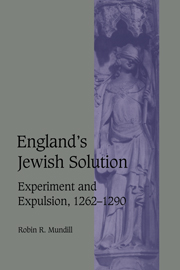Book contents
- Frontmatter
- Contents
- List of figures
- List of tables
- Preface
- Acknowledgements
- List of abbreviations
- Weights and measures
- Jewish nomenclature
- Chronology
- 1 The English Exodus re-examined
- 2 Jewish settlement, society and economic activity before the Statute of the Jewry of 1275
- 3 ‘The King's most exquisite villeins’: the views of royalty, Church and society
- 4 The royal tribute
- 5 The attempted prohibition of usury and the Edwardian Experiment
- 6 The economic fortunes of provincial Jewries under Edward I
- 7 The Christian debtors
- 8 Interpreting the English Expulsion
- Appendix I Places of jewish settlement, 1262-1290
- Appendix II The Statute of the Jewry, 1275
- Appendix III Articles touching the Jewry
- Appendix IV Charles of Anjou's Edict of Expulsion, 1289
- References
- Index
- Cambridge Studies in Medieval Life and Thought
1 - The English Exodus re-examined
Published online by Cambridge University Press: 16 October 2009
- Frontmatter
- Contents
- List of figures
- List of tables
- Preface
- Acknowledgements
- List of abbreviations
- Weights and measures
- Jewish nomenclature
- Chronology
- 1 The English Exodus re-examined
- 2 Jewish settlement, society and economic activity before the Statute of the Jewry of 1275
- 3 ‘The King's most exquisite villeins’: the views of royalty, Church and society
- 4 The royal tribute
- 5 The attempted prohibition of usury and the Edwardian Experiment
- 6 The economic fortunes of provincial Jewries under Edward I
- 7 The Christian debtors
- 8 Interpreting the English Expulsion
- Appendix I Places of jewish settlement, 1262-1290
- Appendix II The Statute of the Jewry, 1275
- Appendix III Articles touching the Jewry
- Appendix IV Charles of Anjou's Edict of Expulsion, 1289
- References
- Index
- Cambridge Studies in Medieval Life and Thought
Summary
‘You have achieved in one day what the Pharaohs of Ancient Egypt failed to do’, commented one contemporary chronicler on the occasion of Edward I's Expulsion of the Jews from England. In 1272 Edward I became king; in 1290 he expelled the Jews from England. On his accession, Edward styled himself ‘Edwardus, dei gratia, Rex Angliae, dominus Hiberniae, et dux Aquitaniae’. He subsequently received such titles and historical epithets as the Hammer of the Scots, the English Justinian, the Conqueror of the Welsh, but rarely has he been considered as the instigator of one of the earliest European expulsions of the Jews. During his reign the Anglo-Jews were indeed, as contemporaries noted, ‘condemned to wander the earth and to be cut off’. The English Exodus has subsequently received comparatively little attention. It is mentioned by contemporary chroniclers in just a few curt lines. Perhaps typical of the type of comment was the observation made by John of Oxnead, who noted that:
The Lord the King condemned all Jews of whatever sex or age living throughout England into perpetual exile without any hope of return. In truth, out of all that large number of Jews, whose total number from young to old was reckoned to be 17,511, no one who would not be converted to the Christian faith either by promise or allurement remained beyond the fixed and decided day of departure.
- Type
- Chapter
- Information
- England's Jewish SolutionExperiment and Expulsion, 1262–1290, pp. 1 - 15Publisher: Cambridge University PressPrint publication year: 1998

